The UCAT is a test of cognitive skill, not academic knowledge. Success hinges on understanding its unique structure, consistent timed practice, and developing strategic approaches for each section.

The Dream, The Doubt, and The Exam
Meet Sarah. For as long as she can remember, she’s dreamed of becoming a doctor. She’s aced her biology exams, volunteered at a local clinic, and spent countless hours shadowing physicians. Her application is nearly perfect, but one final, formidable hurdle stands between her and medical school: the UCAT.
The University Clinical Aptitude Test, or UCAT, is a name that sends a shiver down the spine of many aspiring medical and dental students across the UK, Australia, and New Zealand. It’s not a test of what you know, but how you think. It’s a two-hour, high-pressure assessment of your innate skills. For students like Sarah, who are used to succeeding through hard work and memorization, the UCAT feels like an entirely different beast. How do you study for a test that doesn’t have a syllabus?
If you’re in the same boat as Sarah, feeling a mix of ambition and anxiety, you’ve come to the right place. This guide will demystify the UCAT, offering a clear roadmap from confusion to confidence. We’ll break down each section, discuss proven preparation strategies, and explore how to cultivate the right mindset for success.
What Exactly is the UCAT?
Before you can conquer the beast, you need to understand it. The UCAT is a computer-based admissions test used by a consortium of universities to help select applicants. With thousands of students applying with top grades, universities need an objective way to assess other essential qualities like problem-solving, critical thinking, and professional judgment.
To help you visualize the challenge ahead, here is a breakdown of the five distinct cognitive areas the exam assesses.
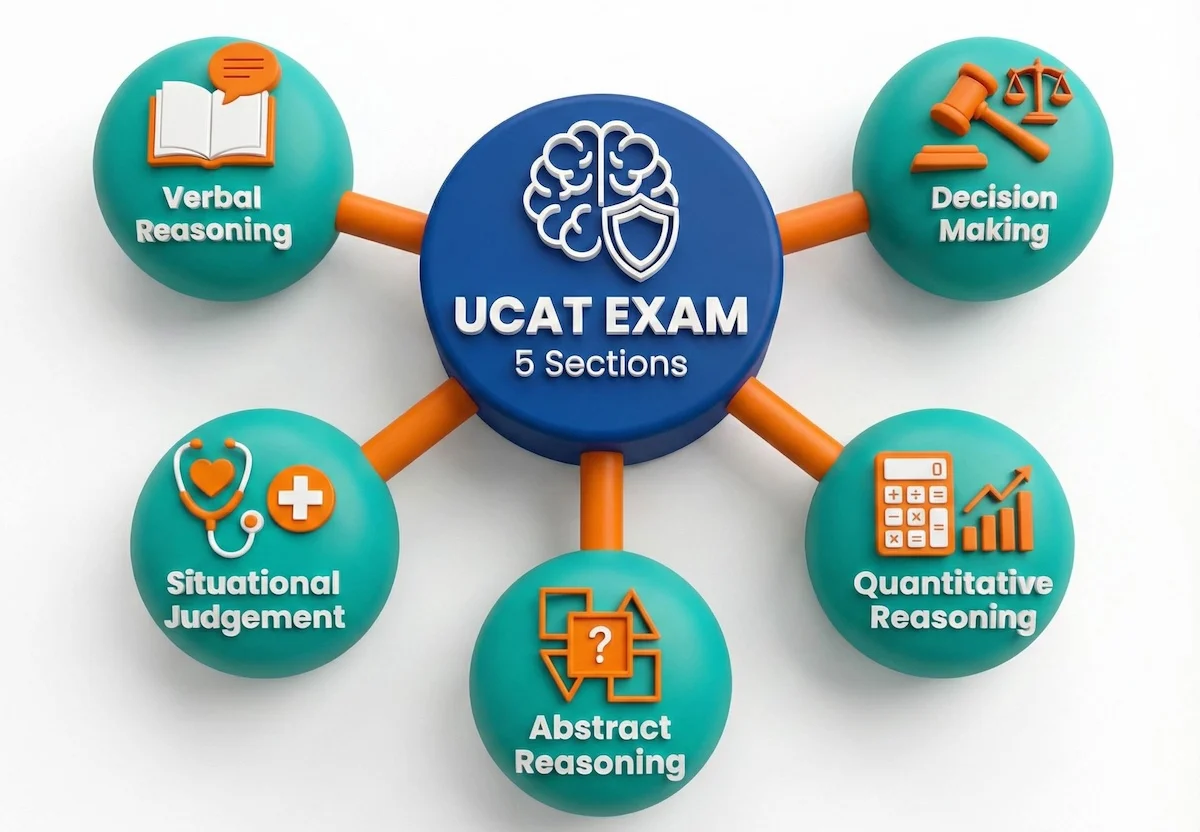
The UCAT tests five distinct cognitive areas, ranging from logical reasoning to medical ethics.
Understanding how these sections interact is the first step toward building a balanced preparation strategy.
According to the official UCAT Consortium, the test is designed to “help universities select applicants with the most appropriate mental abilities, attitudes and professional behaviours required for new doctors and dentists to be successful in their clinical careers.” It’s a standardized measure of your potential, not your past performance.
The exam is comprised of five distinct sections, each with its own unique challenge and unforgiving time limit.
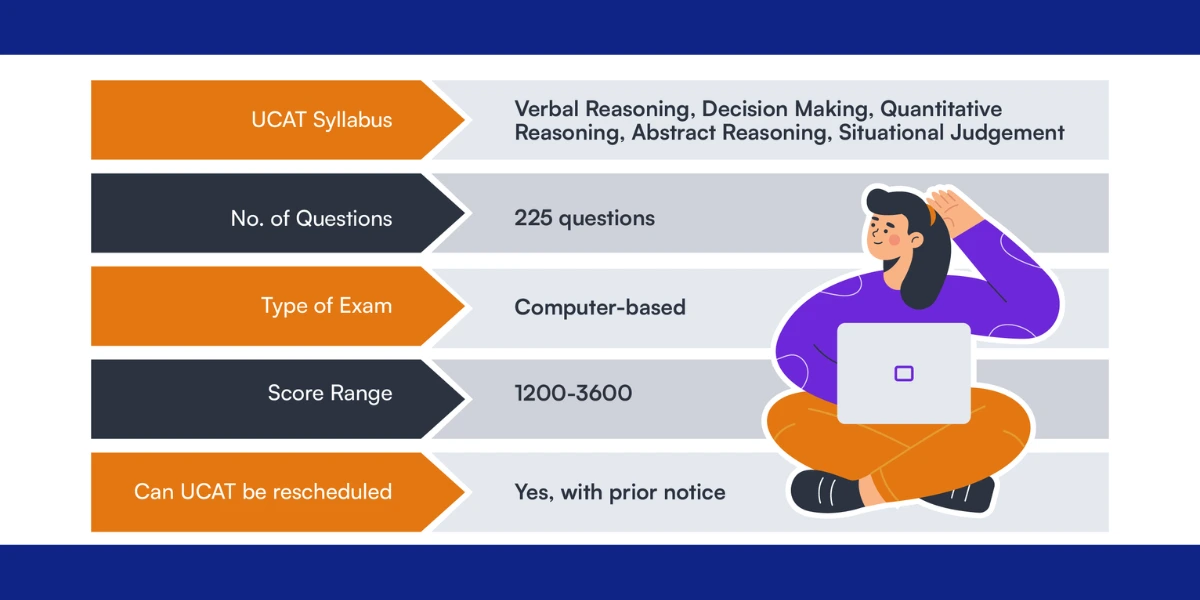
Verbal Reasoning
This section assesses your ability to read a passage of text and determine whether specific conclusions can be drawn from it. It sounds simple, but with 11 passages and 44 questions in just 21 minutes, it’s a race against the clock. It tests your ability to skim, scan, and critically evaluate information without making assumptions.
Decision Making
Here, your logic and reasoning are put to the test. You’ll be presented with various scenarios, often involving text, charts, or diagrams, and asked to make sound decisions and judgments. This section has 29 questions in 31 minutes and tests your ability to evaluate arguments, analyze statistical information, and deduce logical conclusions.
Quantitative Reasoning
This is the math section, but it’s less about complex calculations and more about practical problem-solving. You’ll have 25 minutes to answer 36 questions based on data presented in tables, charts, and graphs. A simple on-screen calculator is provided, but your mental math skills and ability to quickly interpret data are what truly matter.
Abstract Reasoning
Often considered the most alien section, Abstract Reasoning tests your ability to identify patterns and relationships from seemingly random shapes. With 50 questions to tackle in just 12 minutes, it’s a high-speed test of your pattern-recognition skills and lateral thinking.
Situational Judgement Test (SJT)
The final section is different from the rest. It presents you with realistic scenarios you might face as a medical student or doctor and asks you to rate the appropriateness or importance of various responses. It’s a test of your ethical compass and understanding of professional integrity. While the scoring is in bands (1-4) rather than a numerical value, it is critically important, with many universities automatically rejecting applicants in Band 4.
The Preparation Journey: It’s a Marathon, Not a Sprint
One of the first questions every student asks is, “When should I start preparing?” The answer isn’t a specific date, but a specific mindset. The consensus among high-scoring candidates is that 6 to 8 weeks of consistent, focused preparation is the sweet spot. Any less, and you might not have time to build the necessary skills. Any more, and you risk burnout, which is a very real threat.
Consider the tale of two students, Alex and Maria. Alex, a classic crammer, downloaded a question bank two weeks before his test and tried to drill thousands of questions. He quickly became overwhelmed, his scores stagnated, and his anxiety skyrocketed. Maria, on the other hand, started eight weeks out. She spent the first week simply understanding the test format. Then, she began slow, untimed practice, focusing on accuracy. Only in the final four weeks did she ramp up to timed mocks. Her progress was steady, manageable, and ultimately more successful.
Building Your UCAT Study Plan
A successful UCAT preparation journey follows a logical progression. You can’t run before you can walk.
- Familiarization: Spend the first week or so using the free resources on the official UCAT Consortium website. Understand the question types for each section and the strict time constraints. Don’t worry about performance yet; just get comfortable with the format.
- Skill Development: Begin practicing questions, but focus on strategy and accuracy first. For each question you get wrong, spend time understanding why you got it wrong. Was it a knowledge gap, a misinterpretation, or a silly mistake? This is where true learning happens.
- Timed Practice: Once you feel comfortable with the question types, it’s time to bring in the timer. The UCAT is as much a test of speed as it is of skill. Start doing timed mini-sections and gradually build up to full mock exams.
- Mock Exams and Review: In the final few weeks, simulating the full two-hour exam is crucial. It builds your mental stamina. But the most important part is the review. Dedicate as much time to reviewing your mock as you did to taking it. Analyze your performance, identify weak areas, and refine your strategies.
It helps to view your preparation as a four-stage marathon rather than a sprint. The roadmap below outlines the ideal progression to prevent burnout.
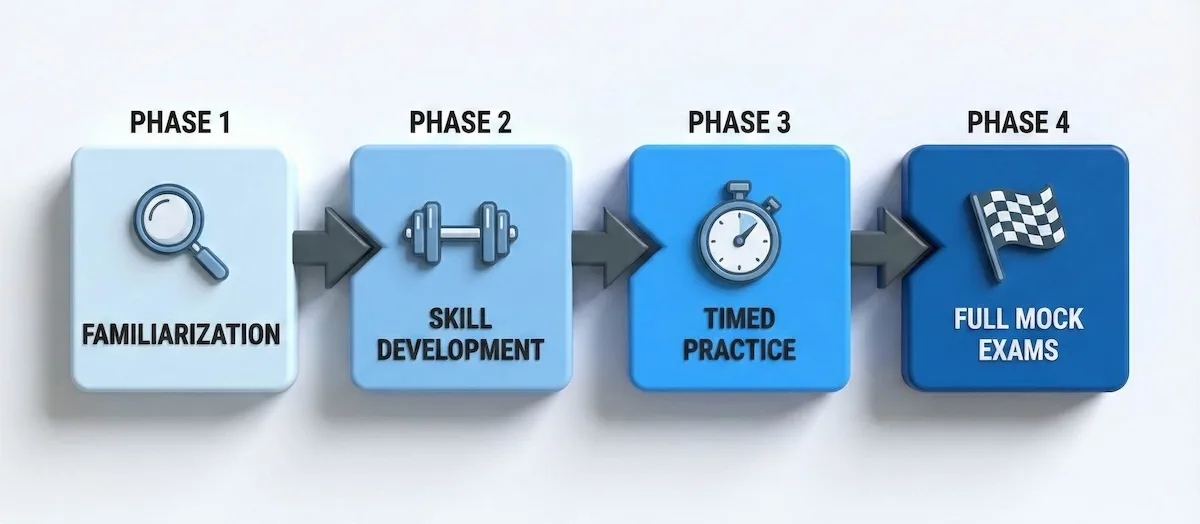
Structure your preparation like a marathon: build skills first, then add speed, and finish with full exam simulations.
By following this timeline, you ensure that you peak exactly on exam day, rather than exhausting yourself too early.
Why Go It Alone? The Role of Expert Guidance
Self-study is a valid path for many students, but it’s easy to hit a wall. You might find your scores on a certain section just won’t budge, or you might keep making the same types of mistakes without understanding the core issue. This is often where targeted support can make all the difference.
Engaging with professional guidance isn’t a sign of weakness; it’s a strategic move to optimize your preparation. When the stakes are as high as a place in medical school, ensuring you have the best possible strategy is a wise investment.

The Advantage of a UCAT (University Clinical Aptitude Test) Tutor
Working with an expert who understands the nuances of this exam can transform your preparation. A skilled UCAT (University Clinical Aptitude Test) tutor does more than just explain answers; they teach you how to think like the test-makers. They can diagnose your specific weaknesses and provide a personalized study plan, saving you from wasting time on your strengths. They provide the expert strategies and shortcuts that can shave precious seconds off each question, which can add up to a significantly higher score.
Finding the Right Support: UCAT Tutoring Online
In today’s digital world, expert help is more accessible than ever. The rise of UCAT (University Clinical Aptitude Test) tutoring online means you can connect with a top-tier mentor from anywhere in the world. This flexibility allows you to fit preparation around your school, work, and life commitments. An experienced UCAT (University Clinical Aptitude Test) tutor online can utilize digital tools to make sessions interactive and effective. This form of UCAT (University Clinical Aptitude Test) teaching is tailored to the individual, focusing on the areas that need the most improvement.
Moreover, this support extends beyond live sessions. Many services provide structured UCAT (University Clinical Aptitude Test) homework help to reinforce the strategies learned. This guided practice, often in the form of UCAT (University Clinical Aptitude Test) assignment help, ensures you are applying new techniques correctly and consistently. For students needing quick clarifications, some tutors even offer ad-hoc UCAT (University Clinical Aptitude Test) hw help. Ultimately, whether you need a comprehensive course or just want to hire a UCAT (University Clinical Aptitude Test) tutor to overcome a specific hurdle, expert guidance can provide the structure, accountability, and confidence needed to excel.
Deep Dive: Strategies for Each UCAT Section
Scoring well on the UCAT requires more than just intelligence; it requires strategy. Here are some proven tips for each section.
Conquering Verbal Reasoning
- Keywords are Key: Before reading the full passage, quickly read the question and identify the keywords. Then, scan the passage for those specific words or synonyms. This is much faster than reading the entire text thoroughly.
- Triage Aggressively: Some passages are incredibly dense and convoluted. If a question seems like it will take too long, make an educated guess, flag it, and move on. It’s better to answer two simpler questions in the same amount of time.
Mastering the art of ‘triage’ is essential for finishing on time. Use this decision flow to quickly determine which questions to tackle and which to skip.
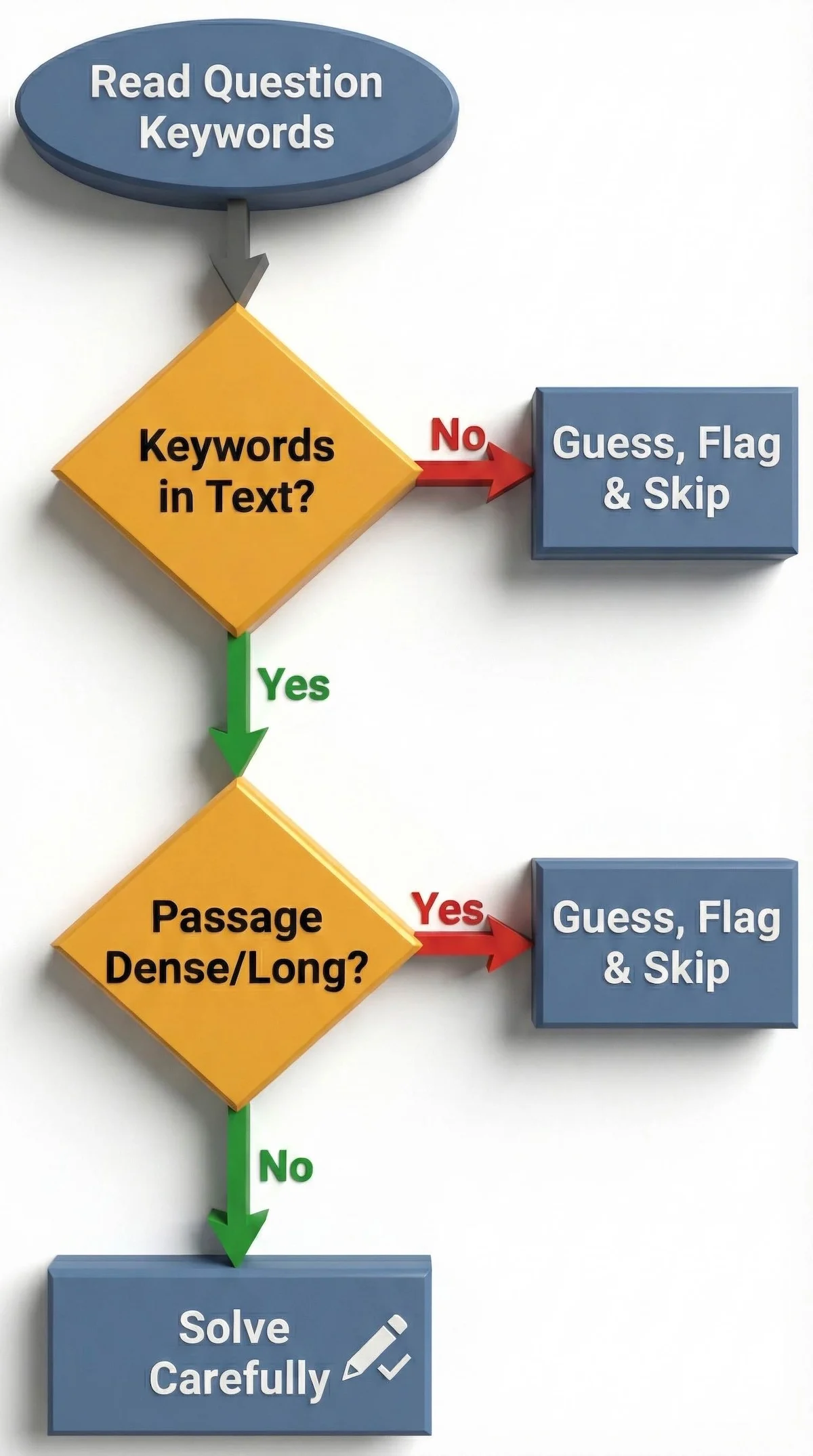
Use this triage workflow to avoid getting stuck on dense passages and maximize your score efficiency.
Internalizing this decision process will save you valuable seconds on every single question.
Mastering Decision Making
- Use Your Scratchpad: For logic puzzles, quickly sketch out Venn diagrams or simple tables on your physical whiteboard or notebook. Visualizing the information can make complex relationships much clearer.
- Evaluate Arguments Systematically: When presented with “strongest argument” questions, check if the argument is relevant to the question, addresses all parts of the premise, and isn’t based on an unstated assumption.
Excelling in Quantitative Reasoning
- Calculator Last Resort: The on-screen calculator is clunky. Use it only when you have to. Practice your mental math, especially for percentages, fractions, and speed/distance/time calculations, to save valuable time.
Many students lose points simply by overusing the calculator. The comparison below highlights when to trust your mental math versus when to reach for the tool.
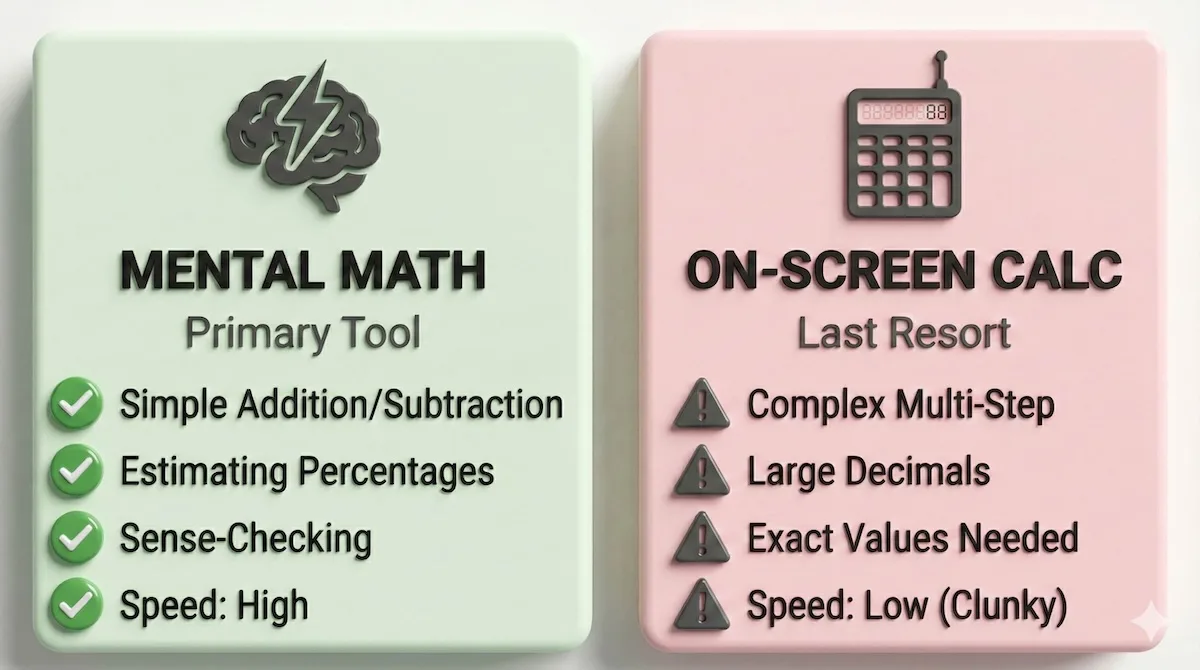
Only rely on the on-screen calculator for complex data; use mental math and estimation for the majority of questions.
Training your mental math muscles is often the highest-yield activity for improving your Quantitative Reasoning score.
- Sense-Check Your Answers: Before clicking your final answer, do a quick “sense-check.” Does the number look reasonable in the context of the question? This can help you catch simple calculation errors.
Decoding Abstract Reasoning
- Use a Mnemonic: Many students find a checklist helpful to systematically search for patterns. A popular one is SCANS: Shape, Colour, Arrangement, Number, Size. Run through these categories for each box.
When you hit a mental block on a pattern, don’t panic—just run through the checklist below.

When stuck on a pattern, cycle through the SCANS checklist to identify the rule.
Memorize this visual checklist so you can instinctively cycle through it during the pressure of the exam.
- Focus on the Simplest Box: In a given set, look for the box with the fewest shapes or simplest arrangement. The underlying pattern is often easiest to spot there.
Navigating the Situational Judgement Test
- Patient Safety First: In any clinical scenario, the patient’s immediate safety and welfare are paramount. Any action that upholds this is likely to be appropriate.
In ethical scenarios, it can be hard to choose between two ‘good’ options. Use this hierarchy of priorities to make the right call every time.
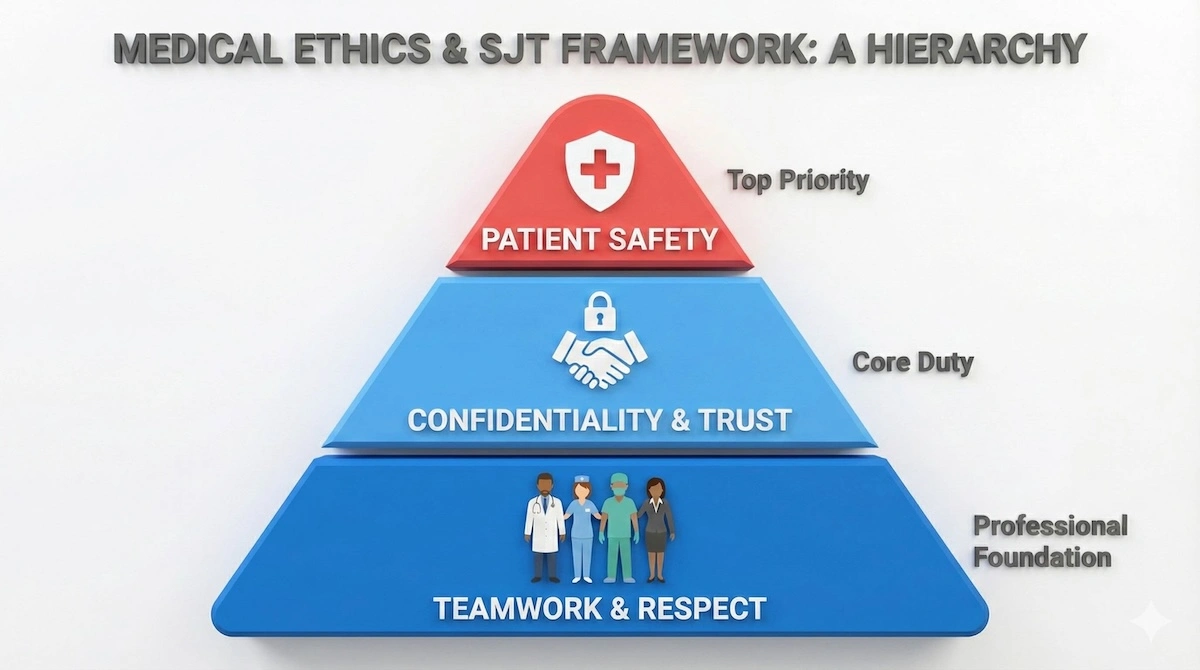
In any SJT scenario, always prioritize patient safety and public trust above all other factors.
If ever in doubt, always choose the option that prioritizes patient safety above all else.
- Know Your Ethics: Familiarize yourself with the core principles of medical ethics, such as those outlined in the GMC’s Good Medical Practice guidelines. Concepts like patient confidentiality, teamwork, and honesty are central to this section.
Your Path to Success
The journey to medical or dental school is a demanding one, and the UCAT is a significant part of that challenge. It’s a test designed to push you to your limits, to see how you perform under pressure, and to assess the very skills you’ll need as a future healthcare professional.
Remember Sarah? By adopting a strategic approach, practicing consistently, and focusing on her mental well-being, she transformed her anxiety into confidence. She learned to see the UCAT not as a barrier, but as the first step in her medical training—a chance to prove she had the aptitude to succeed.
Your path will be your own, but the principles of success are the same. Understand the test, prepare strategically, and don’t be afraid to seek support when you need it. The UCAT is tough, but it is conquerable. With dedication and the right approach, you can walk into that test center ready to show them what you’re made of.
Frequently Asked Questions (FAQs)
Q1. How long is the UCAT exam?
The UCAT is a two-hour computer-based test administered at a Pearson VUE test centre.
Q2. Is the UCAT a knowledge-based test?
No, it primarily assesses your cognitive skills and aptitude rather than your academic knowledge.
Q3. Can I use a calculator for the UCAT?
A simple on-screen calculator is provided for the Quantitative Reasoning section only.
Q4. What is a good UCAT score?
A score above 680 is generally considered competitive, but this varies each year by university.
Q5. How important is the Situational Judgement section?
The SJT is crucial as many universities use it to screen candidates and will not consider those in Band 4.
Q6. When is the best time to take the UCAT?
Most students take the test in the summer before submitting their university applications.
Related Subjects
UCAT Quantitative Reasoning
UCAT Situational Judgement
UCAT Verbal Reasoning
******************************
This article provides general educational guidance only. It is NOT official exam policy, professional academic advice, or guaranteed results. Always verify information with your school, official exam boards (College Board, Cambridge, IB), or qualified professionals before making decisions. Read Full Policies & Disclaimer , Contact Us To Report An Error
